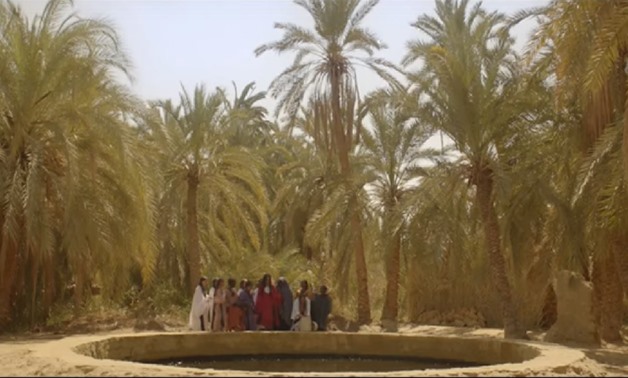
The Bride preparing for her bath ( Photo: still from episode ‘Wahet El Gheroub’)
CAIRO- 3 June 2017: Ramadan series ‘Wahet El Gheroub’, inspired by an Egyptian novel, depicted marriage traditions in Egypt’s Siwa Oasis in one of its episodes aired on Friday.
Directed by Kamla Abo Zekry, the episode revolved around Malika and Radwan’s wedding, where the traditions are first displayed in an early morning scene in which the bride celebrates with her female friends and the groom celebrates with his male friends.
The bride showers alone in one of the water oases as her friends sing. She then heads home after her bath where her friends dress her in the traditional Siwa bridal dress and dance with her until she is escorted by her uncle and the father of the groom to her new home.
The bride’s brother carries his sister over his shoulders through the doorway, as her feet are not supposed to touch the floor until she reaches her husband’s bedroom.
The groom bathes in the oasis on his own as well but during the night time and later heads to a private men’s-only wedding party where his friends dance and sing. The groom later arrives at his new home to find his wife waiting for him where they begin their lives as an officially married couple.
The Arabic series is based on a novel by Bahaa Taher that won an International Prize for Arabic Fiction. Released in 2008, the novel revolves around Egyptian police officer Mahmoud Abdel Zaher who is transferred to Siwa along with his Irish wife Catherine after sympathizing with the revolutionary thoughts of Jamal el-Din al-Afghani and Ahmed Orabi amid the British Invasion in the 19th century.
Portraying a real era in Egyptian history, the novel portrays the couple’s integration with Siwa’s community and forces them to confront their reality in a time of betrayal, love, heroism, and deceit, according to a statement on Good Reads.
The story also seeks to blend the future and the past and showcase the concerns of the country, international relations, and civil human interaction.
Comments
Leave a Comment